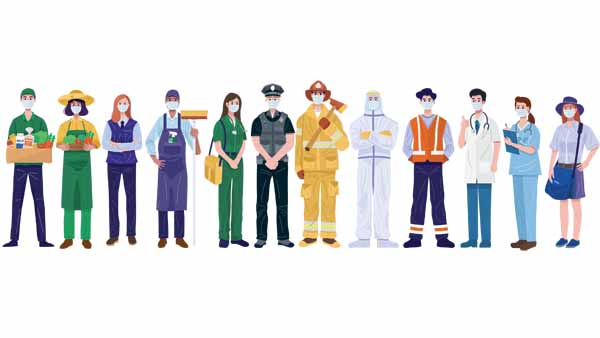The Indiana Chamber Foundation has been producing practical policy research to improve Indiana’s economic climate since 1981.

Shutterstock photo.
(Indianapolis, Ind.) - Employers are aggressively taking proactive steps to try and solve some of the workforce challenges that have been prevalent in recent years. The findings are illustrated in the 13th annual employer workforce survey from the Indiana Chamber of Commerce and its Institute for Workforce Excellence®.
Skillful Indiana was the lead sponsor of the survey, with support from Amatrol and WGU Indiana. There were 937 responses (during a two-week period in mid-September) across a broad range of industries.
“For years, we have heard leaders in the business community lament the lack of skilled employees to meet their workforce needs,” says Indiana Chamber President and CEO Kevin Brinegar. “It appears they are now tackling the issue head-on, offering additional opportunities to attract talent for today and tomorrow.”
Work-based learning opportunities increased significantly compared to a year earlier in the following areas:
- Student site visits (32% in 2020 survey; 22% in 2019 survey)
- Job shadowing (29%; 24%)
- High school internships (26%; 20%)
- College internships (55%; 38%)
- Apprenticeships/long-term training programs (18%; 11%)
- None of the above (24%; 40%)
For existing employees, 43% (compared to 34% a year ago) of employers say they partner with schools or other training providers to develop talent. This is accompanied by increases in employers offering tuition reimbursement (34% to now 43%) and flexible work hours to help with education attainment (41% to 53%).
Awareness of the state’s Next Level Jobs program has grown from 38% in the 2019 survey to 54% this time around. In addition, 49% (30% in 2019) indicate they have changed recruitment/hiring practices to assess potential employees for competencies and skills rather than strictly education level or credential.
“Following the familiar playbook wasn’t working previously and certainly won’t in the recovery from COVID-19,” shares Jason Bearce, Chamber vice president for education and workforce policy. “New issues have emerged, and new collaborative strategies must be embraced.”
The employer efforts may explain decreases in two trends that had demonstrated the growth of the workforce challenge over many years of the survey.
Those who cite filling workforce needs as their biggest or one of their biggest challenges plummets to 37% after being as high as 80% two years ago. The decrease in employers leaving jobs unfilled due to underqualified applicants was far less dramatic – from 49% a year ago to 45% in 2020.
COVID-19, of course, dominated so many business actions in 2020. Employers shared the following in relation to the ongoing pandemic and its impacts going forward:
- Forty-three percent will utilize employees to perform additional job functions; 18% will retrain employees due to deployment of new technology; and 12% will automate more job functions
- Of the 22% which decreased their workforce in response to COVID-19, 35% say they will not return to pre-COVID employment levels. Another 9% that stayed the same in 2020 anticipate potential decreases in the coming year
Overall, 41% expect the size of their workforce to increase over the next 12 to 24 months. This represents a decline from 45% in the 2019 survey and 56% a year earlier.
Employers were asked about a work share program, which allows them to reduce the hours of employees (who receive partial unemployment benefits) in lieu of full layoffs. Sixty percent support such a program (in place in 28 other states) and only 5% oppose. The remainder neither support or oppose, or they are unsure.
Due in part to the efforts of the Indiana Workforce Recovery initiative from the Indiana Chamber and Wellness Council of Indiana, employers terminating employees/applicants as the result of a first failed drug test decreased from 52% in 2018 to 30% in 2019. That further declined to 27% in the current survey.
“With more than 40% of employers saying they expect to have employees perform additional job functions next year, and a fifth saying they have already transitioned employees to utilize their skills in other roles, employers will need to invest in their existing workforce in the coming months to help navigate these changes,” says Bill Turner, executive director, Skillful Indiana and National Rework America Alliance Delivery, Markle Foundation.
“As employers seek to adapt to the changing economy, workers will need training and support that provide equitable access to opportunities. Those employers that can successful identify the skills their workers have – and help them to acquire the new skills they need – will be able to move faster and react more quickly to the changing economy.”
Full survey results are available at www.indianachamber.com/education.
The Indiana Chamber Foundation has been producing practical policy research to improve Indiana’s economic climate since 1981. The Institute for Workforce Excellence is dedicated to helping businesses attract, develop and retain skilled employees by bringing together tools and resources to assist in building that talent pipeline

 Kentucky's Governor Declares State of Emergency Ahead of 4-Day Severe Weather Event With Possible Tornadoes
Kentucky's Governor Declares State of Emergency Ahead of 4-Day Severe Weather Event With Possible Tornadoes
 Indiana Attorney General combats contraband cell phones in prisons
Indiana Attorney General combats contraband cell phones in prisons
 Kentucky State Police Traffic Safety Checkpoint
Kentucky State Police Traffic Safety Checkpoint






